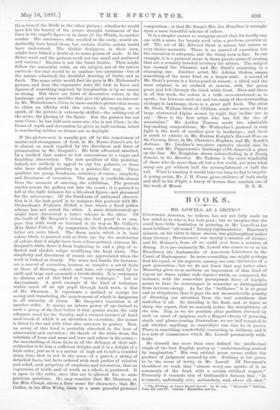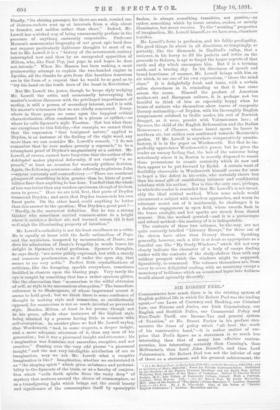BOOKS.
MR. LOWELL AS A CRITIC.* CULTURED America, we believe, has not yet fully made up her mind as to who is her best poet ; but we imagine that she could have little hesitation in pointing to Mr. Lowell as her most brilliant " all-round " literary representative. Emerson's mission, on his visits to these shores, was philosophical rather than literary; Hawthorne's was mainly a mission of silence; and Dr. Holmes's, from all we could ever bear, a mission of dining. It is pre-eminently Mr. Lowell who comes to us as his Excellency the Ambassador of American Literature to the Court of Shakespeare. In mere versatility, one might perhaps find his equal, or his superior, among our own litterateurs of a past generation ; but we do not know that any writer since Macaulay gives us so uniform an impression of that kind of vigour (at times rather rude vigour) which, as compared, for instance, with the somewhat paroxysmal force of Carlyle, seems to have its counterpart in muscular as distinguished from nervous energy. As for the " brilliance," it is so great and so ubiquitous, that it pays the not inconsiderable penalty of diverting our attention from the real soundness that underlies it all. So dazzling is the flash, and at times so sharp the report, that we scarcely notice the straightness of the aim. Nay, as we see position after position stormed by such an onset of epigram, such a Rupert-charge of prancing simile and plume-tossing illustration, we are half-tempted to ask whether anything so magnifigue can also be la guerre. There is something wonderfully reassuring in dullness, and it is a sort of reassurance which Mr. Lowell persistently with- holds.
He himself has more than once defined the intellectual staple of the best English poetry as " understanding aerated by imagination." His own critical prose seems rather the product of judgment aerated by wit. Nothing is too grave to be the cause of levity in Mr. Lowell. Of Davenant's Gonclibert we read, that "almost every one speaks of it, as commonly of the dead, with a certain subdued respect." Presently it reminds him of Goldsmith's famous line : "It. is remote, unfriendly (sic), melancholy, and, above all, slow."
* Tho Writings of James Russell Lowell. In 10 vols. " Rivoroido " Edition. Vols. III. and IV. London : Macmillan and Co.
Finally,"its shining passages, for there are such, remind one of distress-rockets sent up at intervals from a ship about to founder, and sadden rather than cheer•." Indeed, Mr. Lowell has a wicked way of being unseasonably profane in the presence of anything eminently respectable. Professor Masson's monumental biography of our great epic hard does not suggest particularly lightsome thoughts to most of us, but to Mr. Lowell it is a " history of the seventeenth century interrupted now and then by an unexpected apparition of Milton, who, like Paul Pry, just pops in and hopes he does not intrude." When Mr. Masson has been making a most praiseworthy attempt to explain the two-handed engine in Lycidas, all the thanks he gets from this heartless American -are in the form of a request that he would be so good as to " try his hand on the tenth horn of the beast in Revelation."
But Mr. Lowell the jester, though he keeps slyly nudging Mr. Lowell the critic, and occasionally interrupting his .master's serious discourse with the privileged impertinence of motley, is still a person of secondary interest, and it is with his master's utterances that we are chiefly concerned. Every- where in these pages we come upon the happiest critical characterisation, often condensed in a phrase or epithet,—as where he calls Spenser's style Venetian. Not but what there are exceptions to this felicity,—for example, we cannot think that the expression " that benignant nature," applied to Dryden, is an instance of the finding of the right word, any more than we can consider Mr. Lowell's remark, " I do not remember that he ever makes poverty a reproach," to be a triumphant proof of Dryden's magnanimity as a satirist. Mr. Lowell, of course, cannot have forgotten that the author of the Achitophel makes physical deformity, if not exactly " a re- proach," at least an occasion for wantonly pitiless derision. Again, the following sentences—also referring to glorious John —appear curiously self-contradictory :—" There are continual glimpses of something in him greater than he, hints of possi- bilities finer than anything he has done. You feel that the whole of him was better than any random specimens, though of his best, seem to prove." Here we are told, first, that parts of Dryden transcend Dryden ; and next, that Dryden transcends his own finest parts. On the other hand, could anything be better than this answer to the question : Was Dryden a great poet P- -" Hardly, in the narrowest definition. But he was a strong thinker who sometimes carried common-sense to a height where it catches a diviner air, and warmed reason till it had • well-nigh the illuminating property of intuition."
Mr. Lowell's catholicity is not his least excellence as a critic. He is equally at home with the facile rationalism of Pope, and the mysticism, tempered by mensuration, of Dante, nor .does his admiration of Dante's frugality in words lessen his delight in Spenser's verbal profusion. Spenser's thoughts, he says finely, " are never pithily expressed, but with a stately and sonorous proclamation, as if under the open sky, that seems to me very noble." Perfect little crystallisations of oriticism, like the foregoing, sparkle everywhere, sometimes huddled in clusters upon the blazing page. Very rarely the oye is caught by something that has a rather specious glitter, like the observation that " mannerism is the wilful obtrusion of self, as style is its unconscious abnegation." The immediate reference is to Shakespeare, of whose impersonal accent it seems to hold good ; but we think there is some confusion of thought in making style and mannerism so antithetically opposed, for mannerism is not so much inverted as perverted style. Besides, Milton, at least in. his poems, though not in his prose, affords clear instances of the highest style being attained by a process having little in common with self-abnegation. In another place we find Mr. Lowell saying, that Wordsworth " had, in some respects, a deeper insight, and a more adequate utterance of it, than any man of his generation ; but it was a piecemeal insight and utterance ; his ii Imagination was feminine, not masculine, receptive, and not creative." Passing over the very odd phrase "a piecemeal insight," and the not very intelligible attribution of sex to imagination, may we ask Mr. Lowell what a receptive imagination is like P Imagination, whether we understand it as " the shaping spirit" which gives substance and prehensi- bility to the figments of the brain, or as a faculty of conjura- tion which "calls forth spirits from the vasty deep" of mystery that mutters around the shores of commonplace, or as a transfiguring light which brings out the occult beauty and significance of the commonplace itself by apocalyptic
flashes, ie always something transitive, not passive,—or rather, something which by turns creates, evokes, or merely illuminates, but never receives. To the " aerating " properties of imagination, Mr. Lowell himself, as we have seen, elsewhere testifies.
Mr. Lowell's forte is profusion, and his foible prodigality. His good things lie about in all directions, so temptingly, so portably, like the diamonds in Sindbad's valley, that a reviewer, in his hurry to fill his pockets and retire on the proceeds to Balsora, is apt to forget the larger aspects of that earth and sky which encompass him. But it is a teeming earth, and a bracing sky. In his directness of speech and broad heartiness of manner, Mr. Lowell brings with him an air which, to use one of his own expressions, " blows the mind clear." It is delightfully fresh and tonic, with a certain saline shrewdness in it, reminding us that it has come across the ocean. Himself the product of American mother-wit and European culture, it is perhaps not too fanciful to think of him as especially happy when he treats of authors who themselves show traces of composite literary nationality,—of Dryden, with his thoroughly English temperament subdued. to Gallic modes, his suit of Norwich drugget, as it were, punkt with Valenciennes lace ; of Spenser, the child of the English Reformation and the Italian Renascence ; of Chaucer, whose laurel opens its leaves in northern air, but strikes root southward towards Boccaccio's garden. If Mr. Lowell is anywhere comparatively unsatis- factory, it is in the paper on Wordsworth, Not that he im- perfectly appreciates Wordsworth's power, but he gives the reader an uneasy feeling that, the hub of the universe being notoriously where it is, Boston is secretly disposed to resent those pretensions to cosmic centricity which do now and then appear to be put forward by Rydal. A certain want of flexibility observable in Wordsworth himself seems for once to beget a like defect in his critic, who certainly shows less than his usual gift of establishing intimate and confidential relations with his author. Nor is this the only case, perhaps, in which the reader is reminded that Mr. Lowell's is not invari- ably the ideal critical method. When some minds would circumvent a subject with noiseless approaches, and worm its reluctant secret out of it insiduously, he challenges it to a decisive engagement in open field, where swords flash in the brave sunlight, and hot sparks are struck from dinted armour. But, the method granted—and it is a picturesque and robust method—his mastery of it is indisputable.
The contents of these two volumes, by-the-way, are not quite correctly labelled "Literary Essays," for three out of the eleven have other than literary themes. Speaking generally, however, such a title is at least as appropriate as a fanciful one like " My Study-Windows," which did not very clearly indicate the character of a body of essays dealing rather with the contents of the study-shelves than with any outdoor prospect which the windows might be supposed, figuratively, to command. The volumes themselves arc, from cover to cover, delightful reading, with no monotony except a monotony of brilliance which an occasional lapse into dullness would almost agreeably diversify.



































 Previous page
Previous page